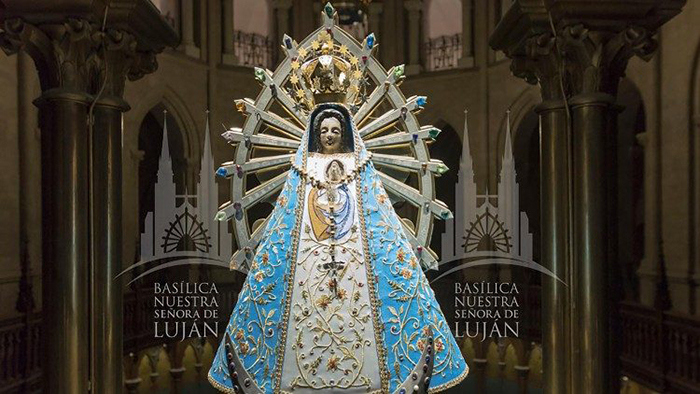José Maria C.S. André
In last May 12’s audience, the Pope told of a miracle that he experienced close up when he was in Buenos Aires.
“There was a married couple with a nine-year-old daughter, who had an illness that the doctors were unable to diagnose. And in the end, the doctor told mother: ‘Madam, call your husband.’ The husband was at work; they were laborers, they worked every day. And he told the father: ‘The child will not survive the night. There is an infection; there is nothing we can do.’ Perhaps that man did not attend Mass every Sunday, but he had great faith. He left, weeping; he left his wife there with the little girl in the hospital, he took the train and he travelled seventy kilometers towards the Basilica of Our Lady of Luján, Patroness of Argentina. And there—the Basilica was already closed, it was almost ten o’clock at night, in the evening—he clung to the grates of the Basilica and spent all night praying to Our Lady, fighting for his daughter’s health. This is not a figment of the imagination: I saw him! I saw him myself. That man there, fighting. Finally, at six o’clock in the morning, the church opened, and he entered to salute Our Lady: all night ‘fighting’, and then he returned home. When he arrived he looked for his wife but could not find her. And he thought: ‘She has left us. No, Our Lady cannot do this to me’. Then he found her, smiling as she said: ‘I don’t know what happened. The doctors said that something changed, and now she is cured.’ That man, fighting with prayer, received the grace of Our Lady. Our Lady listened to him. And I saw this: prayer works miracles, because prayer goes directly to the heart of the tenderness of God, who loves us like a father.”
This story came immediately to my mind when I received an email this morning: “I am in the IPO (Lisbon oncological hospital). Recurrence of the leukemia I had 4 years ago. A real shock! I had to reorganize myself and now, admitted in the hospital, I am looking for the meaning of everything that is happening to me. I find strength in prayer and therefore I am also grateful for the prayers of family and friends and I count on you.”
I picked up the phone straightaway to speak to this friend of mine. We talked until the treatments forced us to interrupt the conversation. He told me he was praying. More than asking for a cure, he was asking to take advantage of these circumstances in which God put him. That reminded me once again of the Pope’s audience because, after telling the story of the miracle he had witnessed, he added:
“And when God does not grant us a grace, He will grant us another that in time we will see. But always, it is necessary to battle in prayer to ask for grace. Yes, at times we ask for a grace we need, but we ask for it without truly wanting it, without fighting. But serious things are not asked for this way. Prayer is combat, and the Lord is always with us.”
The Pope spoke a lot about struggle in this audience. Struggling with ourselves but also fighting with God. Perhaps this is what Christ was referring to when He said that “the Kingdom of Heaven suffers violence and the violent take it by force” (Mt 11:12). St Paul never had the opportunity to visit the city of Colossus, in Phrygia, but he sent Epaphras, a collaborator of his, and then wrote the Colossians a letter. Among the final salutes, sending greetings from each one of his companions, he gives them news of Epaphras: “Greetings from Epaphras, your fellow citizen, who is always wrestling for you in his prayers, so that you can stand mature and fully assured in everything God wills. For I bear him witness that he has worked hard for you” (Col. 4:12-13). The original word means “is always wrestling” or “is always fighting” and the Latin translation is faithful to this sense: “semper certans.”
The relationship with God is so strong that the word “fight” is needed to express what prayer is. Not because of aggressiveness, but because of the intensity with which we acknowledge the fatherly tenderness of God’s love for us. He always listens to us, the Pope said at this audience.
“If in a moment of blindness we cannot perceive his presence, we will succeed in the future. We will also end up repeating the same sentence that the patriarch Jacob said one day: ‘Surely the Lord is in this place; and I did not know it’ (Gen 28:16). At the end of our life, looking back, we too will be able to say: ‘I thought I was alone, but I was not: Jesus was with me’. We will all be able to say this.”


 Follow
Follow


